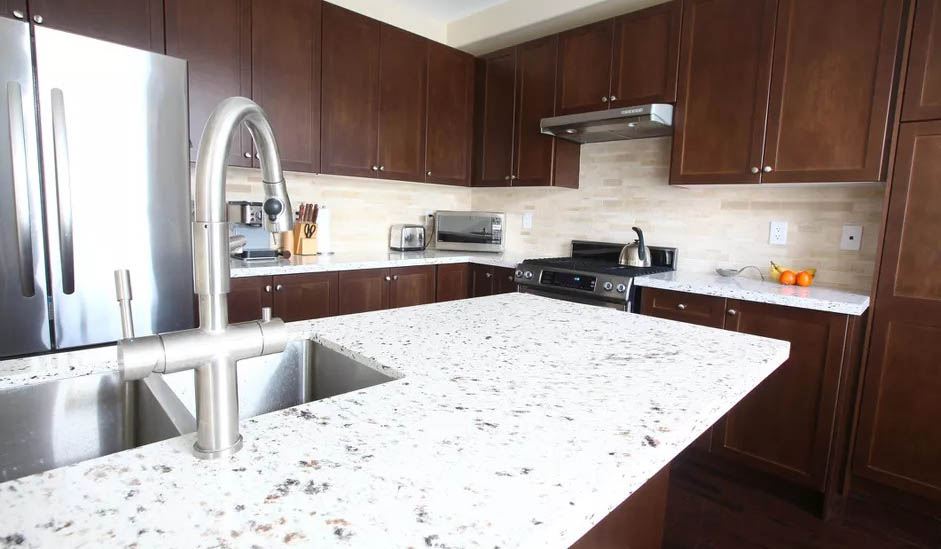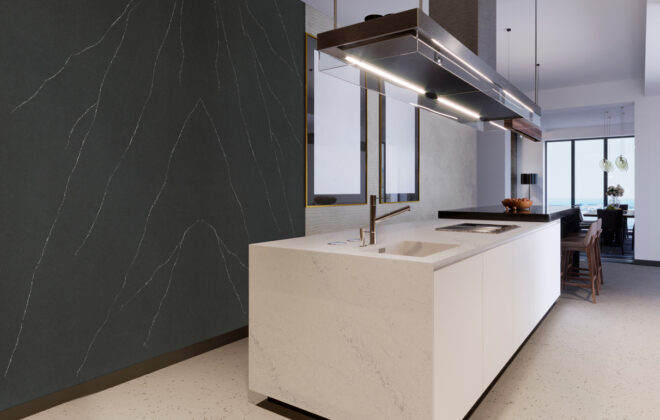Quartz Countertops: What to Know Before You Buy
Kitchen countertops need to be durable, attractive, and easy to clean and maintain. While many countertop materials hit a few positive points, quartz countertops hit them all.
Quartz countertops have developed a reputation over the last few decades as high-end surface material. But the process of gaining respect has been slow. Even today, quartz counters compete with solid surface materials such as Corian and natural stone for space in kitchens and baths.
Basics of Quartz Countertops
Quartz countertop material is a hard, manmade product used mainly in kitchens and bathrooms.
Quartz is an agglomerate (or mixture) of stone-like materials bound with resins and pressed into sheets. It excels over natural stone because it needs no sealing. Its resins are the sealant. Few imperfections in quartz materials show because its manufacture is controlled.
Well-known quartz counter brand names include Caesarstone, Cambria, and Silestone.
Quartz’s closest rival is a material called solid surface, as both employ stone-like materials. Quartz is not to be confused with laminate, a material mainly composed of paper and plastic and applied to a particleboard base.
Quartz Countertop Ingredients
Even if you are not familiar with quartz as a name for this material, you may be familiar with its more prosaic name: engineered stone counters.
In simple terms, quartz counters are 93-percent made up of stone-like materials and 7-percent of binders that are either plastic-like (polymeric) or cement-based. Of those stone-like materials, quartz is only one of many substances.
According to countertop maker Breton, other materials include granite, marble and natural stone in general. These materials come from either crushed waste stone from quarries or recycled industrial waste. Waste includes fragments of ceramic, silica, glass, mirrors, or more.
These stone-like materials provide quartz counters with the solidity, durability, and lack of porosity needed for the heavy demands of cooking. Some manufacturers also combine antibacterial substances.
History of Quartz Countertops
The Italian company Breton patented the process of forming solid surfaces from quartz and resins. All quartz counter brands emanate from this single company. This single company was started by one man, Marcello Toncelli. His company’s name, Brevetti Toncelli (roughly meaning Toncelli Patents), was condensed to Breton (Bre = Brevetti, Ton=Toncelli).
Numerous companies such as Cosentino (Silestone), DuPont, Cambria, and others used Breton’s patent for their own type of quartz countertops. For example, DuPont’s version of the quartz countertop is called Corian Quartz (formerly Zodiaq). Silestone’s quartz is simply Silestone (since this is their flagship product).
Benefits of Quartz Countertops
- Great Looks: For many buyers, the chief benefit of the quartz countertop is its natural luster. Unlike laminate, quartz has a deep, almost three-dimensional appearance, much like natural stone.
- Hardness: Quartz is extremely hard and makes for a good work surface. It is largely composed of minerals (contrasted with solid surface counters which are about 33-percent inorganic binding resins and 66-percent organic minerals). Laminate in no way rivals quartz in this area, because of the laminate’s particleboard wood base layer, which gives it a hollow feeling.
- Few or No Imperfections: Slab granite is a natural product, ripped straight from the earth and sliced into sheets; it is expected that the slab will have imperfections. Installers have an easier time dealing with quartz than they do with granite because it is a predictable material and produces less waste product.
Cost of Quartz Countertops
Quartz counters are rarely inexpensive, even compared to other high-cost alternatives such as natural slab granite.
Expect prices to begin at $60 and $100 per square foot for high-quality brands such as Cambria, Caesarstone, Silestone, or Dupont Zodiaq.
Though quartz countertops have a higher upfront cost, this cost is usually balanced out by quartz’s tendency to last for years longer than other countertop materials. Plus, quartz countertops consistently bring in high resale values.
Tip
For a similar look but at lower prices, try a different material: solid surface. One benefit of solid surface over quartz countertops is that minor scratches in solid surface can be sanded out.
Engineered Appearance
Since quartz countertops are engineered, almost any type of color can be brought out on the surface by means of pigmentation. Not only that, but other types of materials such as stone and glass can be incorporated into this quartz-resin slurry.
For anyone who wants a granite countertop, it is worth investigating quartz counters as an alternative. Quartz has much of the chaotic appearance as does natural stone, without stone’s unpredictability.




